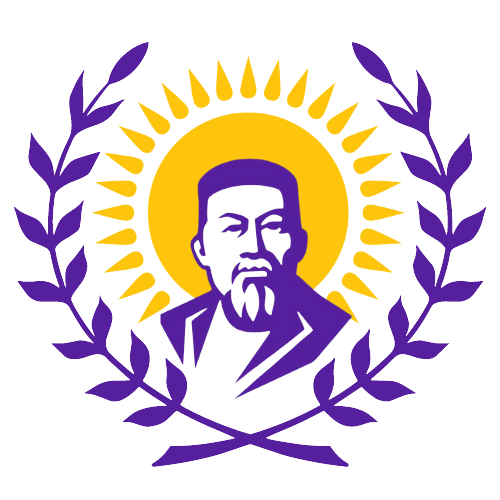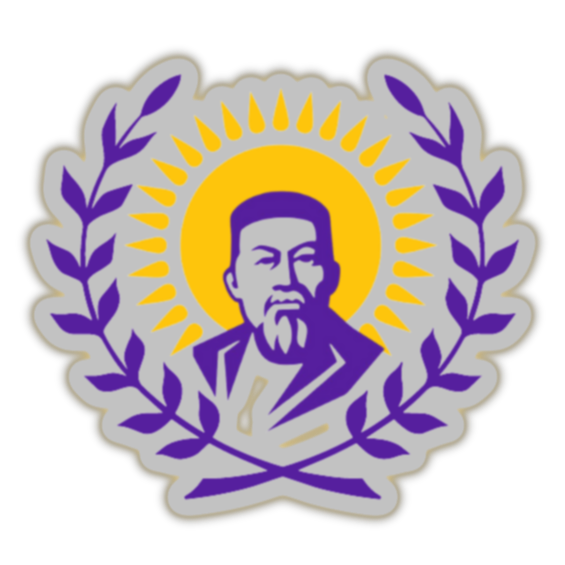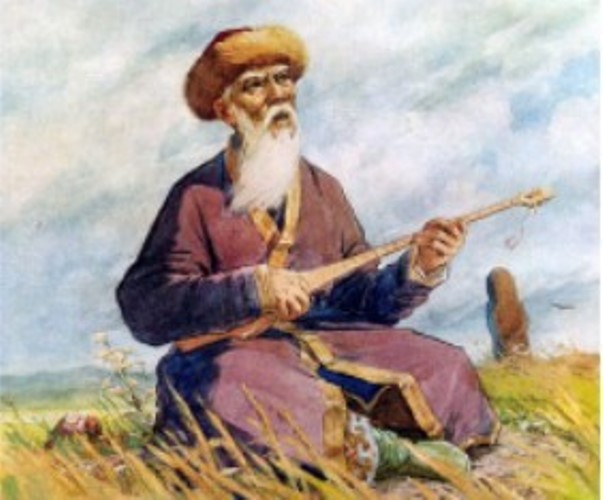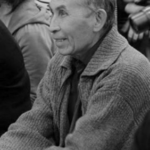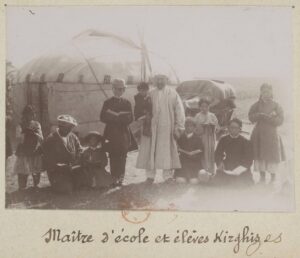Kazakh bards, or jyrau, were folk poets and singers of the steppes since at least the 15th century. Given the widespread traditions of oral literature and specific mission and style of their lyrics, jyrau can be considered the founders of Kazakh literature, who contributed to both poetic and prose genres. Edyge Daregulovich Tursunov, a prominent Kazakh scholar and an expert in Turkic studies and Kazakh folklore, had studied the heritage of oral literature and expanded the concept of the term jyray; he found out that they were not only composers and performers of lyrics and music but also belonged to the military aristocratic class and played an enormous political role.
This article is an edited translation of Tursunov’s work “History of the Origins of the Types of Jyrau” (2004).
On the etymology of the word
The Kazakh word jyr means song, poem. But in the past, it had a broader meaning encompassing epic legends and this term is as ancient as the jyrau themselves. Back in 1950’s Soviet scholars Smirnova and Ismailov did extensive work on etymology of the word jyrau. Ismailov pointed out that the word “yyragu” can be found in the dictionary of Mahmud Kashgari in the meaning of “singer-musician”. Similar word exists in the Tatar language, and again “jyr” means song, while jyrau is a storyteller of historical songs “(Ismailov, 1956). Vassiliy Radlov, a prominent scholar who is considered to be a founder of Turkology, in the second part of the first volume of his “Experience of the Dictionary of Turkic dialects” includes the same word “yr”; in the first part of the third volume we see “yyr”, “yyrly jyr”, “yyrla”, “yyrd jyr”; in the first part of the fourth volume – “jyrau”, “jyrraushy”. They are located in different parts of the dictionary, but not in connection with each other (Radlov, 1893-1911).
A medieval Uzbek poet Lutfi wrote a poem “Tulle and Nauruz” (1411-1412) where we meet the expression: “yyraular safua sakilar gulandam” (“Pure yyrau and rose-colored cupbearers”). Elsewhere in the poem, it tells about the Turkic narrator Bulbul.
The connection between the term “jyrau” and “jyr” is clearly manifested among the Mongols and the Tatars. In the Tatar language, “jyru” means “to perform epic songs”. The prominent expert of Tatar folklore N. Isanbet writes: “jyruchy” in the ancient way or “jyrau” was the name of the performers of heroic legends, dastans. The word “jyrchy” also comes from this root (Isanbet, 1970).
In the Mongolian language, the same root is preserved in the word “kirgeech”—singer. (Damdinsuren Luvsandendev, 1969).
In the history of the language, there are many cases when words from one language family permeate the other language family due to long-standing contacts, neighborhood, and shared history. For example, many words from Turkic languages are found in the modern Russian language, such as the word “tabar”, or tavar, which has been preserved with the same meaning in the Russian language meaning “goods”; the Finno-Ugric “yuz” – meaning “people” – has come to mean the names of the Kazakh three territories and families of tribes – Uly juz, Orta juz. Kishi juz. In the Armenian language words “ata”, “dede” mean “storyteller”, “singer-improviser” (Abbasov, 1966). The Turks call their famous poet Korkut “ata” and “dede”, hence “Korkyt ata”, “Korkyt dede” may mean “Korkut jyrau” not an “old man Korkut” or “grandfather Korkut,” as is usually translated.
In other nomadic people
In medieval Mongolia, folk bards—tuulchi—composed improvised odes called magtaal, glorifying batyrs and generals, wishing good in erool in their honor, gave advice to khans, and taught them. As evidenced by Rashid ad-Din, the magtaals (compare with maktau – praise – odes in Kazakh epics) were deliberately exaggerating. Rashid-ad-Din writes about one of the sons of Kabul Khan: “Poets of the Mongols composed many verses in praise of him and described his courage and bravery. They say that his voice was so loud that his scream was heard across seven hills and was like an echo that echoes in another mountain, that his hands were like the paws of a bear: he could grab the strongest man with both hands, and, like a wooden arrow, without any difficulty bent him in half and broke his spine. It is said that on winter nights he would put whole trees into a fire and lay down beside it. Hot coals fell from the burning fire on his body and burned him, but he did not even bother. When he woke up, he thought that lice bite him. He scratched his body and fell asleep again. Each meal consisted of a whole large three-year-old ram and one huge bowl of kumis, and yet he was never full” (Rashid ad-Din).
The genre of instructions was poplar across other nomadic peoples. Mongol surgaaly means the same as tolgau among Kazakhs and Karakalpaks, nasyyat and terme among Kyrgyz. They contain instructions on how a person should behave in various situations of everyday life and in the event of a war or an enemy raid; teachings to the khans on how to govern the state and the people.
If two suns rise in the sky,
They will dry up all water in the wells.
If two khans will ascend to the throne.
They will destroy their subjects …
If you send a fool as an ambassador,
He will destroy his people.
(Mikhailov, 1969, 18)
The ancient Uigur manuscript “Oguz-name” tells a story of a certain Ulug-Turluk, who acts as a sorcerer-soothsayer and adviser to the Oguz-Kagan: “… Under Oguz-Kagan there was a gray-bearded, gray-haired, very clever old man, a reasonable, wise man, a magician. His name was Ulug-Turluk” (Korogly, 1976). The Crimean Tatars have preserved only one (but main) function of the jyrau: by jyrau they call the soothsayers of the future (Ismailov, Tursunov, 1968).
About functions of jyrau
Kazakh jyrau were considered prophetic poets who foresaw the future. They enjoyed freedom from the court of the khan but still were actively involved in the state affairs concerning the entire khanate (or ulus, union of tribes), they gave advice and instructions to shu, batyrs, and generals in the form of instructive poems-improvisations, praised commanders and batyrs in zakh-maktau, historical songs, and heroic epics.
In wartime, the jyrau were part of the military council under the khan, performing the same functions. They also had to encourage soldiers by reminding them of the heroic epic of the past, raising their fighting spirit. Jyrau perfectly knew the genealogy of clans and tribes, their history and used this knowledge to create historic songs, heroic epics, odmaktau and instructive philosophical reflections – improvisations which were called tolgau.
In contrast to the akyns (also poets in the oral literature of the Kazakhs), who were closely linked with their clan, the jyrau were equally associated with all clans and tribes that were part of the tribal union (khanate). The “prophetic” songs of the jyrau served to inspire the army, edify to preserve unity and cohesion in the khanate, warn against the internal strife typical of nomads, against making campaigns without sufficient preparation, and advise on military discipline. With these edifications (terme, tolgau) jyrau begin each of their performances, including the recitals of the heroic epic. Akyns, for example, do not make such introductions. Also, the works of jyrau have been rarely published in Russian, in contrast to many translations of the works of akyns.
Jyrau were also members of the council of biys, which gave instructions to the khan and the people of the entire khanate, regulating relations between the khan and his subjects. In the military council of batyrs and generals headed by the khan, jyrau was the second person after the khan; during the campaigns, together with the generals and batyrs, he was with the khan; before the battle he raised the fighting spirit of the soldiers, improvising instructional verses, historical songs and heroic epics. All this determined the nature of the poetry of jyrau, in which leading were edifying, military, marching motives (Smirnova, 1952, Duisenbaev, 1962, Ismailov, Tursunov, 1968).
Here, for example, is the address of the famous Kazakh jyrau Aktamberdy Saryuly during one of the civil strife. He delivered it to raise the fighting spirit of his confused squad before the battle with the squad of the famous Kazakh commander Bogenbai, who did not know defeat:
O old Bogenbai!
The rain will fall from the sky,
If it is clouded in darkness.
The camp risks great trouble
If one jigit will mock the other.
Saigak will fall down
If he will get into a hole on his way.
No man can be happy,
If misfortunes are pursuing him.
Until you take the blade out of its scabbard –
The enemy will not flinch.
Until you wash away the enemy’s blood.
The honor will have a stain.
If you want to fight, come on, try!
Are you not one of those enemies who cannot be defeated?
A general like the best stallion
Will not stain his honor.
Anyone can chop off a proud, bad head.
We will ruffle your tribe like wool,
Let’s make him swallow the bloody foam.
Let’s blow it to pieces this evening!
(Aldaspan, 1971)
“As a patriarch, singer and spokesman for popular aspirations, jyrau improvise very rarely, only in the most necessary cases. His advice, as a nationwide authority, was sought, in particular, during some general unrest, national crisis, turmoil, or during the invasion of foreign troops into the homeland. Then jyrau called the people to order, inspired them, predicted the outcome of events. Prediction, foreshadowing (bolzhal aytu) is one of the basic techniques of the poetic art of jyrau. In this role he also acts when giving a name to a newborn baby.” (Morgulan, 1959)
Jyrau came mainly from the military aristocracy. For example, the famous jyrau Kitbuqa, a Mongol warrior who died on September 3, 1260 after the battle of Ain Jalut with the Mamluk Turks. The defeat of Mongols at Ain Jalut marked the beginning of the end for the expansion of the Mongol Empire. Kitbuqa reportedly was the leader and the supreme commander of the Naiman tribe that had been a part of the Mongol army. Kaztugan Suyunshuly was a commander, Dospambet was a warrior, Shalkiz Tlenshiuly belonged to the military aristocracy. Jiembet Bortagashuly was one of the commanders, and Margaska jyrau was one of the batyrs of Khan Yesim.
Jyrau enjoyed great prestige not only among the people, but also in the khan’s headquarters. Before making any decision of extraordinary state and political importance, the khans turned to the jyrau for advice, whose word was final and not subject to discussion.
For example, when Khan Abylai, who yet had to complete the defeat of the Kalmyk invaders, decided to start a war with another strong state in order to secure the rear, he turned to Bukhar Jyrau for advice, who told him the following:
Do not fight – this is what Elder Bukhar sings to you,
If you start a war – it will be difficult for you …
If you are Muslims, go away
Across the Syr Darya River.
For three years, preventing the mares from foaling,
Get to Zhndel-Baysyn.
For the good of wives and children
Go there.
I am ninety-three years old,
It’s hard for me to say more.
For the worthless cattle
For the ravines that can’t be won back
You should not start another quarrel.
Abylai Khan followed jyrau’s advice: he sent the civilian population to the rear, away from the front line, and began a series of powerful counterattacks in one direction, against the Kalmyks, which ended in the complete defeat of the latter.
The jyrau’s immense authority can be attested by the fact that the same Burakh, in cases when Abylai Khan opposed the opinion of the military council of the commanders, in verses-edification addressed to the khan, called him a slave, unequivocally hinting at the difficult youth of the khan, who was forced to hide from the persecution of Kalmyks under the guise of a shepherd (Ush gasyr, 1965).
The roles that jyrau played at the military councils and the edifying propose of their instructions required a unique, laconic, aphoristic style of their verses.
Thus, the main functions of the jyrau were:
- engagement with entire state, not with separate clans or tribes,
- involvement in important state issues in peacetime, resolving issues of war and peace – in wartime;
- divination of the future: relying on their ability to “prophetic vision,” jyrau gave instructions to the khan and the people, they sang their divinations, improvising poetry.
